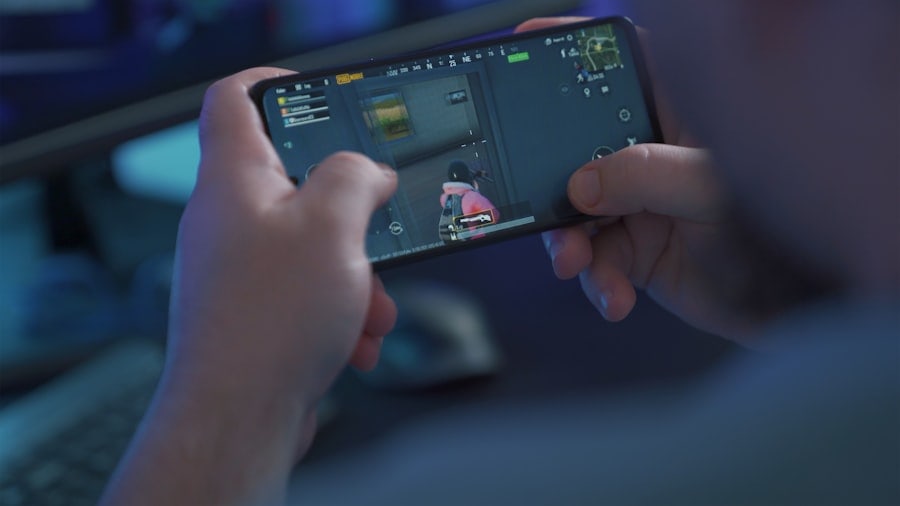The advent of 5G technology marks a significant leap forward in the realm of telecommunications, promising to revolutionize how we connect, communicate, and consume digital content. Unlike its predecessors, 5G is designed to deliver unprecedented speed, capacity, and reliability, enabling a new era of connectivity that extends beyond mere mobile communication. With its ability to support a vast number of devices simultaneously, 5G is set to transform various sectors, including healthcare, transportation, and entertainment.
The technology operates on a higher frequency spectrum, which allows for faster data transmission and reduced latency, making it an ideal candidate for applications that require real-time interaction. As 5G networks continue to roll out globally, the implications for mobile gaming are particularly noteworthy. Gamers have long been constrained by the limitations of existing network technologies, often experiencing lag, buffering, and connectivity issues that detract from the overall experience.
With 5G, these barriers are expected to diminish significantly, paving the way for more immersive and engaging gaming experiences. The integration of 5G into mobile gaming is not merely an enhancement; it represents a paradigm shift that could redefine how games are developed, played, and monetized.
Key Takeaways
- 5G technology is the next generation of mobile network connectivity, promising faster speeds and lower latency.
- The impact of 5G on mobile gaming includes enhanced speed, improved graphics, and the ability to support multiplayer and cloud gaming.
- 5G technology offers enhanced speed and low latency, providing a smoother and more responsive gaming experience for mobile gamers.
- Improved graphics and virtual reality capabilities with 5G technology allow for more immersive and visually stunning gaming experiences on mobile devices.
- Multiplayer gaming and cloud gaming are made more accessible and seamless with 5G technology, opening up new possibilities for mobile gaming experiences.
The Impact of 5G on Mobile Gaming
The impact of 5G on mobile gaming is multifaceted, influencing everything from game design to player engagement. One of the most immediate effects is the potential for seamless gameplay experiences. With 5G’s high-speed capabilities, players can expect smoother graphics and faster load times, which are critical in fast-paced gaming environments.
This improvement is particularly beneficial for genres that rely on quick reflexes and real-time decision-making, such as first-person shooters and battle royale games. The reduction in lag time means that players can react instantaneously to in-game events, enhancing competitiveness and overall enjoyment. Moreover, 5G technology opens up new avenues for game developers to explore innovative gameplay mechanics.
For instance, augmented reality (AR) and virtual reality (VR) applications can thrive in a 5G environment due to the increased bandwidth and lower latency. Developers can create more complex and interactive worlds that respond in real-time to player actions, leading to richer narratives and more engaging gameplay. The ability to stream high-quality graphics directly to mobile devices without the need for extensive local processing power also democratizes access to high-end gaming experiences, allowing a broader audience to participate in advanced gaming without investing in expensive hardware.
Enhanced Speed and Low Latency

One of the hallmark features of 5G technology is its remarkable speed, which can reach up to 10 Gbps under optimal conditions. This speed is a game-changer for mobile gaming, where every millisecond counts. Traditional mobile networks often struggle with latency issues that can lead to frustrating delays during gameplay.
In contrast, 5G networks promise latency as low as one millisecond, which is crucial for competitive gaming scenarios where timing is everything. This near-instantaneous response time allows players to engage in real-time interactions without the fear of lag disrupting their experience.
In games where multiple players interact simultaneously, such as online battle arenas or cooperative missions, the synchronization of actions becomes vital.
This level of responsiveness not only improves gameplay but also fosters a sense of community among players as they engage in shared experiences without the hindrance of technical delays.
Improved Graphics and Virtual Reality
The graphical fidelity of mobile games has seen significant advancements over the years, but 5G technology takes this evolution to new heights. With its high bandwidth capabilities, 5G enables the streaming of high-definition graphics directly to mobile devices without compromising performance. This means that developers can create visually stunning games that rival console and PC experiences while maintaining smooth gameplay on smartphones and tablets.
The ability to render complex environments and detailed character models in real-time enhances immersion and allows players to become fully engrossed in their gaming worlds. Furthermore, the integration of virtual reality (VR) into mobile gaming is poised for a renaissance with the arrival of 5G. VR experiences often require substantial processing power and data transfer capabilities to deliver realistic environments and interactions.
With 5G’s low latency and high-speed data transfer, players can enjoy VR games that are more responsive and lifelike than ever before. This technological synergy allows for more intricate VR experiences that can adapt dynamically to player movements and actions, creating a sense of presence that was previously unattainable on mobile platforms.
Multiplayer Gaming and Cloud Gaming
The rise of multiplayer gaming has transformed the landscape of interactive entertainment, fostering communities and competitive environments that span the globe. With 5G technology, the potential for multiplayer experiences is amplified significantly. The enhanced speed and low latency provided by 5G networks enable smoother interactions between players, allowing for real-time collaboration or competition without the disruptions commonly associated with slower networks.
This improvement is particularly beneficial for large-scale multiplayer games where numerous players interact simultaneously in expansive virtual worlds. In addition to traditional multiplayer formats, cloud gaming stands to benefit immensely from 5G technology. Cloud gaming services allow players to stream games directly from remote servers rather than relying on local hardware capabilities.
This model eliminates the need for high-end devices while providing access to a vast library of games. With 5G’s high-speed connectivity, players can enjoy cloud gaming with minimal lag and high-quality graphics, making it a viable alternative to console or PC gaming. As a result, gamers can experience AAA titles on their mobile devices without sacrificing performance or visual quality.
Opportunities for Game Developers and Publishers

Enhanced Interactivity and Immersion
Games can now incorporate real-time data feeds or location-based elements that respond dynamically to player interactions or environmental changes. This level of interactivity not only enriches gameplay but also encourages players to engage with their surroundings in novel ways.
New Revenue Streams and Monetization Strategies
The advent of 5G also expands the potential for monetization strategies. As mobile gaming becomes more immersive and engaging, developers can explore new revenue models such as subscription services or microtransactions tied to enhanced content experiences.
Seamless Content Delivery and Player Engagement
The ability to deliver high-quality content seamlessly through 5G networks allows publishers to offer regular updates or expansions without disrupting gameplay. This continuous engagement can foster player loyalty and increase lifetime value for both developers and publishers alike.
Challenges and Considerations for 5G Mobile Gaming
Despite the numerous advantages that 5G technology brings to mobile gaming, several challenges must be addressed before its full potential can be realized. One significant concern is the disparity in network coverage; while urban areas may enjoy robust 5G connectivity, rural regions may still rely on older network technologies. This uneven distribution could create a divide among gamers based on geographic location, limiting access to high-speed gaming experiences for some players.
Additionally, there are concerns regarding data consumption associated with high-speed gaming experiences. As games become more graphically intensive and data-heavy due to streaming capabilities, players may face increased data usage costs or throttling from service providers. Developers will need to consider these factors when designing games for mobile platforms, ensuring that they optimize performance without overwhelming users’ data plans.
The Future of High-Speed Mobile Gaming with 5G
Looking ahead, the future of high-speed mobile gaming powered by 5G technology appears promising yet complex. As networks continue to expand and improve globally, we can expect an influx of innovative games that push the boundaries of what is possible on mobile devices. The integration of advanced technologies such as artificial intelligence (AI) and machine learning could further enhance gameplay experiences by personalizing content based on player behavior or preferences.
Moreover, as developers harness the full potential of 5G networks, we may witness a shift in how games are marketed and consumed. The rise of cloud gaming could lead to subscription-based models becoming more prevalent as players seek access to diverse libraries without the need for extensive hardware investments. This evolution could democratize access to high-quality gaming experiences while fostering a more inclusive gaming community.
In conclusion, while challenges remain in fully realizing the potential of 5G technology in mobile gaming, its impact is undeniable. As we move forward into this new era of connectivity, both players and developers stand on the brink of an exciting transformation that promises to redefine how we engage with games in our daily lives.
In addition to the advancements in mobile gaming enabled by 5G technology, affiliate marketing is also a lucrative niche to explore in 2023. According to a recent article on enicomp.com, affiliate marketing offers a great opportunity for individuals to earn passive income by promoting products or services through their online platforms. With the right strategies and tools, affiliate marketers can tap into various industries and generate substantial revenue. This article provides valuable insights into the best niches to focus on for affiliate marketing success in the coming year.
FAQs
What is 5G?
5G is the fifth generation of wireless technology that promises significantly faster data download and upload speeds, wider coverage, and more stable connections.
How does 5G enable high-speed mobile gaming?
5G enables high-speed mobile gaming by providing faster and more reliable internet connections, reducing latency, and allowing for more data to be transferred quickly, resulting in a smoother and more responsive gaming experience.
What are the benefits of 5G for mobile gaming?
The benefits of 5G for mobile gaming include faster download and upload speeds, reduced latency, improved network reliability, and the ability to support more complex and immersive gaming experiences.
How does 5G impact the future of mobile gaming?
5G is expected to revolutionize the future of mobile gaming by enabling more advanced and immersive gaming experiences, supporting real-time multiplayer gaming, and opening up opportunities for cloud-based gaming services.
What are some examples of how 5G is being used in mobile gaming?
Some examples of how 5G is being used in mobile gaming include enabling high-definition streaming of games, supporting augmented reality (AR) and virtual reality (VR) gaming experiences, and powering real-time multiplayer gaming with minimal lag.

